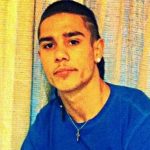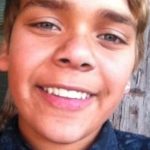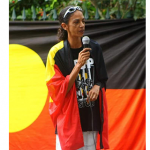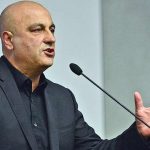Justice Now for David Dungay: An Interview With Leetona Rose Dungay
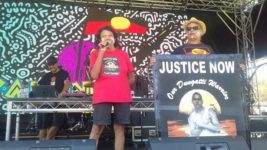
David Dungay Jr called out that he couldn’t breathe a total of twelve times, as six prison guards held him face down on a bed in the prone position. One of the officers said, “If you can talk, you can breathe.” However, medically-speaking, this isn’t the case.
The disturbing CCTV footage of the 26-year-old Dunghutti man’s last minutes, shows guards kneeling on his back despite his distress calls, while a nurse rushes into the cell and administers a 10 milligram shot of midazolam: a fast-acting sedative.
Moments later, David stopped breathing. On the 29 December 2015, Mr Dungay died in custody at Sydney’s Long Bay Prison Hospital. And the reason why the group of officers had taken this action against him is because David, a diabetic, refused to stop eating a packet of rice crackers.
For this seemingly mundane transgression, staff called in the immediate action team (IAT), which specialises in cell extractions. And that’s what they did: they stormed the First Nations man’s cell, grabbed hold of him, dragged him down the hallway and into cell 77, and held him down until he died.
Pressure led to obstructed breathing
The inquest into Mr Dungay’s death was held in July last year. Royal Brisbane Hospital emergency physician professor Anthony Brown gave expert evidence in relation to the ability of a person to continue to speak while they can’t breathe in cases of positional asphyxia.
It was further heard that five of the six immediate action team officers had never undertaken any training regarding positional asphyxia, and indeed, they were completely unaware that there was a risk that David could stop breathing because of the position he was forcibly being restrained in.
However, after close to two weeks of hearings, coroner Derek Lee said the court had run out of time and the inquest would have to resume sometime this year. Renowned human rights lawyer George Newhouse, who is representing the Dungay family, said they were devastated by the further delay.
Ongoing Aboriginal deaths in custody
David’s mother Leetona Rose Dungay has been tirelessly campaigning for justice for her boy. The Dunghutti elder will be giving evidence at the new Forensic Medicine and Coroners Court Complex in Lidcombe, when the inquest begins once more on 4 March.
And not only is it hoped that the Dungay family get some closure from the investigation’s findings, but it’s also anticipated that this case will shine some light on the institutionalised violence that Aboriginal and Torres Strait Islander people are subjected to on the inside.
Sydney Criminal Lawyers spoke to Leetona Dungay about what really happened to her son, the dodgy circumstances surrounding the investigation of the incident and what she’s hoping transpires as the inquest continues.
Firstly, your 26-year-old son David died whilst being restrained by six prison guards in the mental health unit of Long Bay prison in December 2015.
During the struggle he called out that he couldn’t breathe twelve times. Ms Dungay, how would you describe what happened to your son that day?
He’s a diabetic two insulin dependent. And they didn’t know their policies on schizophrenia.
To work in this area, they should be taught all this. In any hospital they should be taught why these sick people are there. How to manage all different sick people with epilepsy and what they were treating Dave for.
All those medications weren’t agreeing with Dave. It made him sicker. No matter how they treated him, because a diabetic two cannot take any strong substance. Drugs can kill you.
He knew not to touch drugs or drink, because he knew that it could affect him and he could die. He wouldn’t take tablets from anyone. They forced it on him. He knew it would kill him.
They said he was on a high. But, when you are on a high, you can go down real low as well. You can drop that fast it’s not funny. You can drop that fast and go into a coma.
And there’s been criticism of the first aid care he received after he stopped breathing. In your understanding, what are the issues surrounding the attempts to revive your son?
They didn’t do anything right. They never cleared his airways from cell one to two. They didn’t do any CPR or anything. All they did was just forcibly restrain him and took the biscuits.
And they took his life as well, when they took the biscuits. They took it with great force.
I understand there was also some issues around the investigation of the scene. Can you explain why the investigation by the detective was inadequate?
There were no clothes. They said they wouldn’t give him his clothes back. I said, “This case was a homicide.” I wanted to talk to George about how the ABC or SBS that said it wasn’t suspicious.
They said it wasn’t suspicious?
Yes. And on the day, I rang up and I wanted a homicide detective to go in and check it. Well, the homicide went in two hours later after Dave’s death.
So, they investigated the scene two hours afterwards?
Yes. The nurses and the screws cleaned up the first room. They took all the evidence and put it in a bag.
Everything had been removed?
Everything had been removed. You know how they tape it all around and put criminal investigation?
Yes.
After they killed him, they never even did anything like that. They changed their uniforms. They took their uniforms off with the blood spurts.
The detective never checked under their nails or their knuckles, because he got assaulted. He got assaulted. He’s got a split across his nose.
Your son was a diabetic, who needed to take food because of his condition. The prison guards were sent in to restrain him, because he refused to stop eating some rice crackers.
Why would the correctional officers react with such a show of force over eating biscuits?
The doctor diagnosed him with schizophrenia. And I can’t understand how he’s got schizophrenia. I wanted them to look up how many times he was in segro.
Segro is four walls with no food. No medication, or they give it when they feel like it.
They call them big soldiers in there. They’ve got to do what the soldiers say, not what the nurses say.
Do you think they acted with excessive force?
Very excessive. They had eight minutes to use excessive force.
Ms Duguay what should have happened on that day?
They shouldn’t have even called the IAT. They shouldn’t have even been called. It was unprofessional of the nurse and doctors.
They shouldn’t have called the IAT in. They already had the normal Correctional Services officers there to deal with him.
They should have called in an Aboriginal social worker. They should have brought in a physiotherapist. And talked him down.
The physiotherapist would have had an idea of what he was dealing with, instead of going in there and killing him.
He’s a diabetic. He’s an inmate. “How am I going to be treated? I’m going to eat this biscuit to keep alive.” He locked himself in there until he could eat enough to save himself. And they didn’t give him time for that.
Midway through the inquest last year it was called off. What was that like after you’d been waiting two and a half years for it to get underway?
That was heartbreaking for all the family. It’s a drama because we know that we’re coming to another week of opening up old wounds. I’d like closure at the end of this court case.
I’d like closure for the family. And everything dealt with in a fair and honest way. And let these bastards be honest about what they did. They bashed my son – blind kill inmates call it.
They had eight minutes to blind kill my son in the first cell. No cameras. Nothing. That’s how they kill them all. In a blind place in the corner of any gaol in Australia. I got told.
You can’t see. They’ll do it out of focus. You notice of all the deaths – ask them where the cameras are. Where were they killed? Where were they found dead? I bet you it was a blind corner, with no cameras in them.
So, you’re saying the footage is not everything that happened?
No. Not in the first cell. Because the screw ran out back down the hall into where all the other hospital cells were. He came from another cell.
What were they doing to my son in those eight minutes? Bashed the shit out of him. Nearly half dead. And then they threw him to the nurse in the second room.
They knew they’d already killed him. Slowly he was dying in that next room. That’s when he died on the bed.


